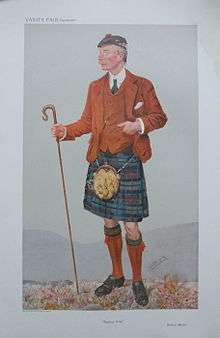Sir Peter Mackie, 1st Baronet
Sir Peter Jeffrey Mackie, 1st Baronet (26 November 1855 – 22 September 1924) was a Scottish whisky distiller and writer.

Mackie was born at St Ninians, Stirling. His father, Alexander Mackie (died 1884), was a distiller. His mother was Jane Simpson Brown (died 1886).
He was educated at Stirling High School and in 1878 joined his uncle's firm, James L. Mackie & Co, at the Lagavulin distillery on Islay. In the mid-1880s, he became a founding partner in Mackie & Co, which was established to market Lagavulin and other whiskies in London. In 1890, the two businesses amalgamated as Mackie & Co (Distillers) and began to blend White Horse. In 1895, Mackie's became a limited company and Peter Mackie became chairman, a post he held until his death. In 1924, the firm was renamed White Horse Distillers Ltd and became a public company.
Mackie travelled and wrote extensively on politics, especially on tariff reform and Imperial Federation. In 1918 he made a gift of pedigree cattle to Rhodesia to encourage ranching and cattle breeding. He also financed the Mackie Anthropological Expedition to Uganda. He was also a major landowner (owning 12,000 acres (49 km2) in Argyllshire), a Justice of the Peace for Argyllshire, Ayrshire and Lanarkshire, and an active member of the Scottish Unionist Association, serving as chairman from 1922.
He was created a baronet in the 1920 Birthday Honours.[1]
Footnotes
- "No. 31931". The London Gazette (Supplement). 4 June 1920. p. 6314.
References
- Biography, Oxford Dictionary of National Biography
- Obituary, The Times, 23 September 1924